情态动词的用法(新人教版)
图片预览


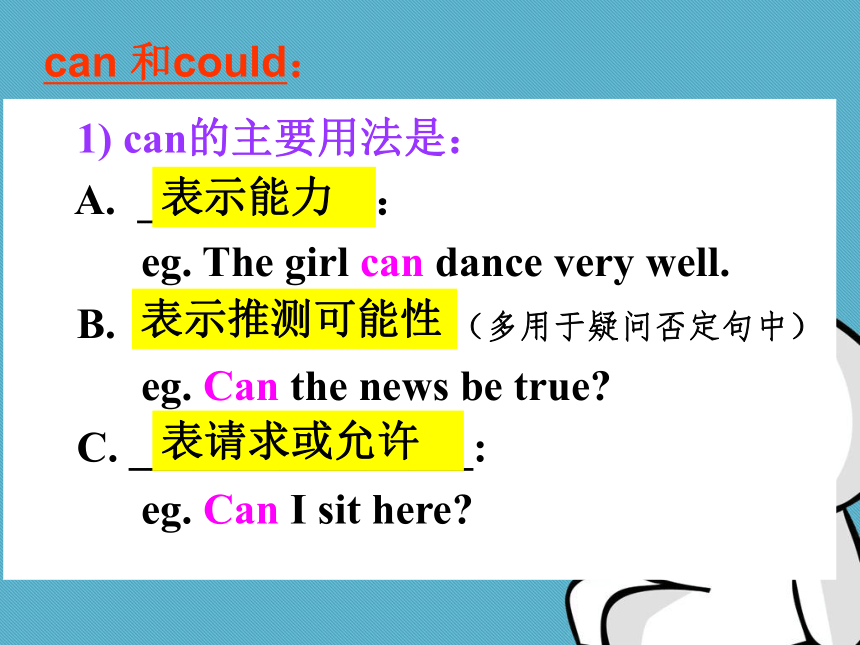
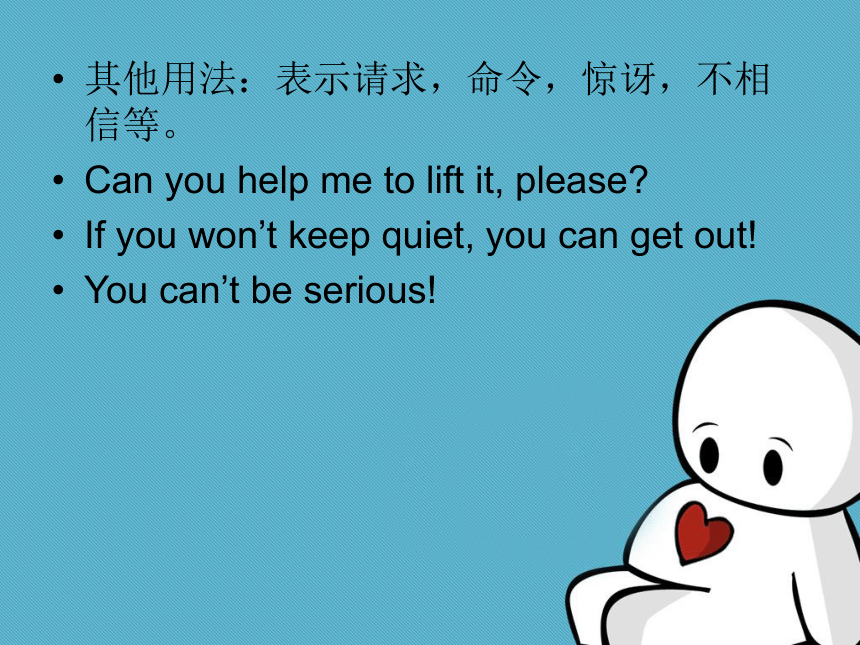
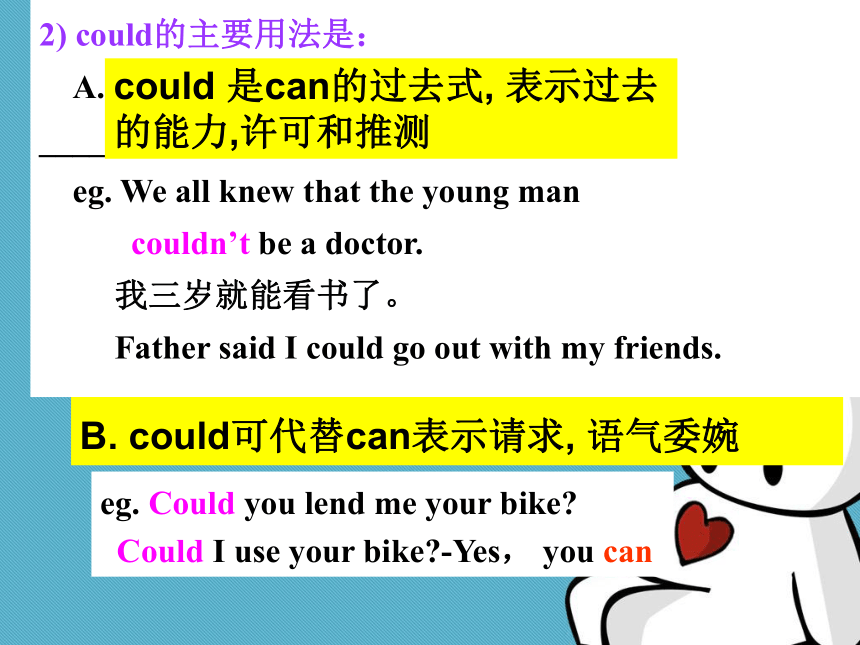
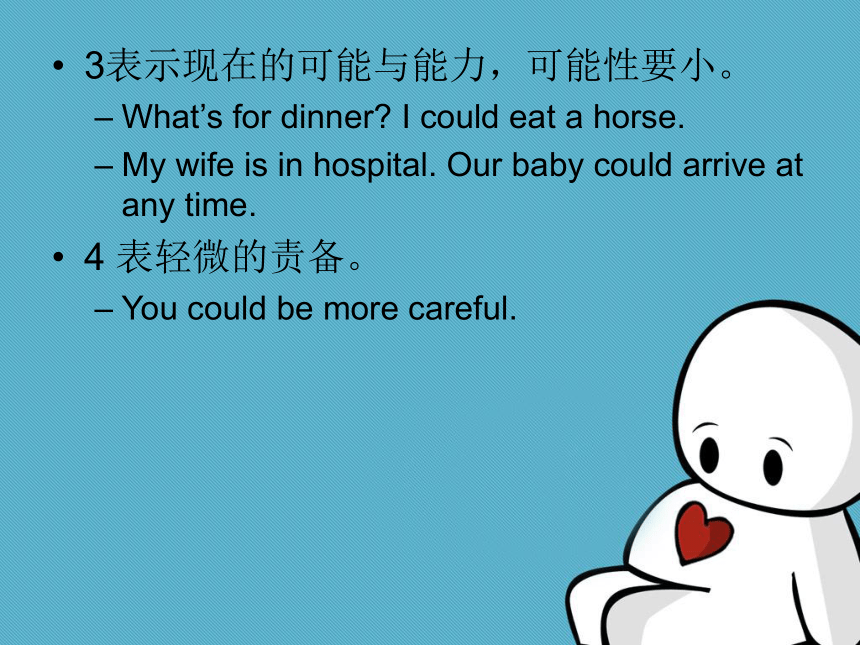
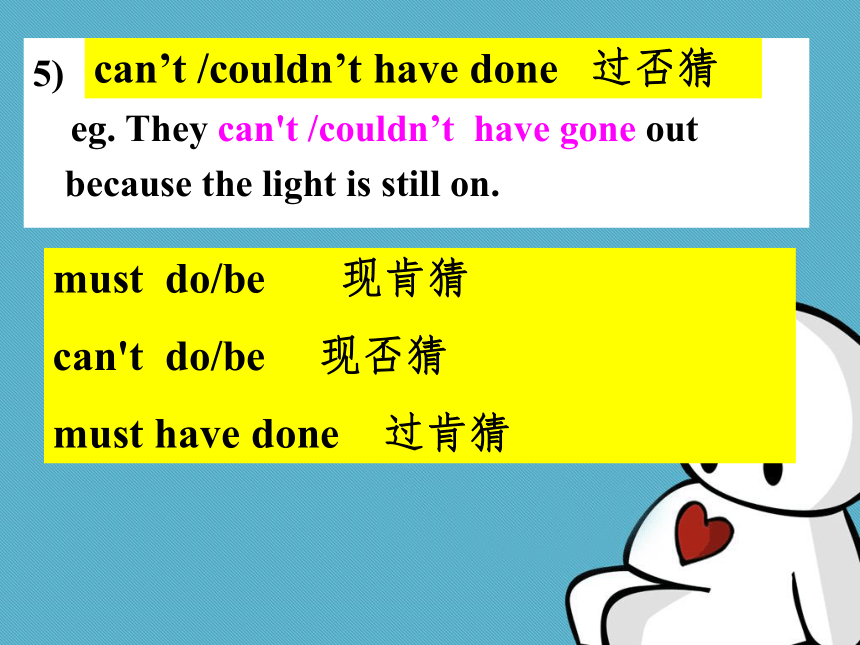
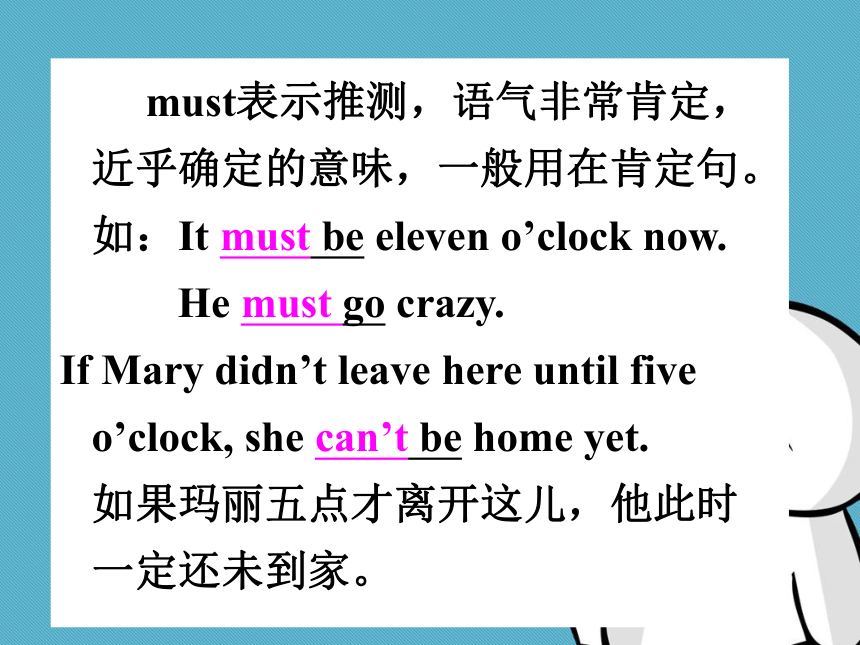
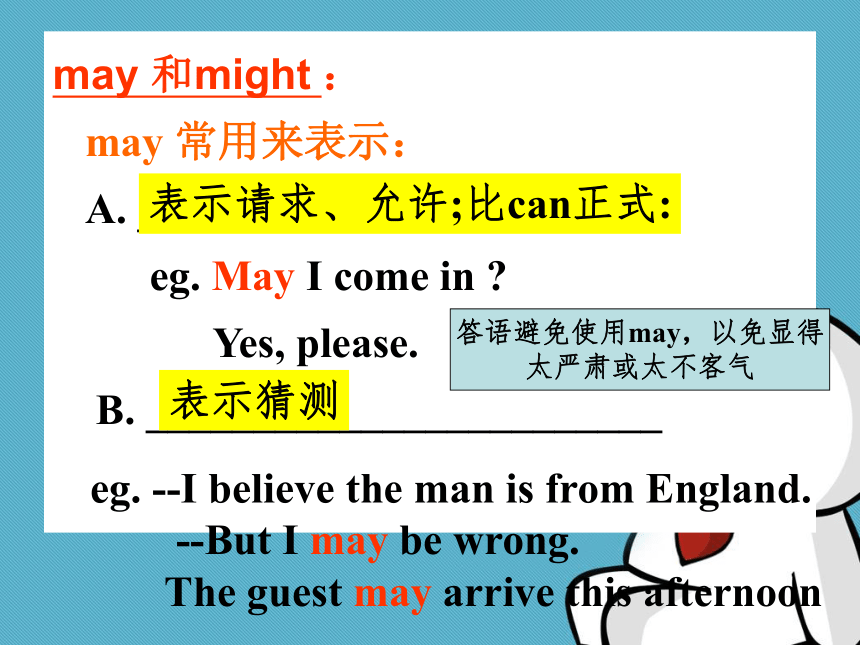
文档简介
课件28张PPT。Grammar课标人教实验版
高一 Module 3
Unit 1情态动词用法 1) can的主要用法是:
? A.? ___________:
? eg. The girl can dance very well.
B.? _____________:
eg. Can the news be true?
C. ________________:
eg. Can I sit here? can 和could:表示能力表示推测可能性表请求或允许(多用于疑问否定句中)其他用法:表示请求,命令,惊讶,不相信等。
Can you help me to lift it, please?
If you won’t keep quiet, you can get out!
You can’t be serious!2) could的主要用法是:
A. ______________________________
____________________:
eg. We all knew that the young man
couldn’t be a doctor.
我三岁就能看书了。
Father said I could go out with my friends.
could 是can的过去式, 表示过去
的能力,许可和推测B. could可代替can表示请求, 语气委婉eg. Could you lend me your bike?
Could I use your bike?-Yes, you can3表示现在的可能与能力,可能性要小。
What’s for dinner? I could eat a horse.
My wife is in hospital. Our baby could arrive at any time.
4 表轻微的责备。
You could be more careful.
5)
eg. They can't /couldn’t have gone out because the light is still on.can’t /couldn’t have done 过否猜must do/be 现肯猜
can't do/be 现否猜
must have done 过肯猜 must表示推测,语气非常肯定,近乎确定的意味,一般用在肯定句。
如:It must be eleven o’clock now. He must go crazy.
If Mary didn’t leave here until five o’clock, she can’t be home yet.
如果玛丽五点才离开这儿,他此时一定还未到家。may 和might :
may 常用来表示:
?A. _________________________
?? eg. May I come in ?
Yes, please.
B. ________________________表示请求、允许;比can正式:eg. --I believe the man is from England.
--But I may be wrong.
The guest may arrive this afternoon表示猜测答语避免使用may,以免显得
太严肃或太不客气 The road may be blocked.
这条路可能不通了。
The road can be blocked.
这条路可能会是不通的。
在疑问句中,表示可能性用can。
如:Where can he be? 他会在哪呢?可能性从大到小: must. can could may might C. _____________________
eg. May you succeed!
May you have a good journey!
表示祝愿;语气较正式:多在间接引语中表示过去的可能和允许。也可以表示现在的可能性,但是比may
表示的可能性更小,且might可以用于虚拟
语气,may不可以。might 的用法有:
She said that he might take her bike.
她说他可以拿她的自行车去用。
You might get some help from her if she were here.will和would: 1.
I will tell you something important.
我将要告诉你一些重要的事Will you tell her that I'm here?
请您告诉她说我在这儿,好吗?
I told him not to do it, but he would.? (助动词)?(情态动词)will是助动词或是情态动词
用于构成将来时是助动词。
用于表“意志/决心/请求”是情态动词。
would亦同理,只是表过去。2. _____________________________________
If you want help, let me know, will you?
如果你需要帮助, 让我知道, 好吗?
? Would you type this, please?
请打印这个,好吗? ?
Won't you sit down?
请坐下,好吗?
疑问句中用于第二人称,提出请求表委婉不是表过去3. _________________________
Would you help us, please?
请您帮助我们,好吗?
I’d go there with you.
我要和你一块到那儿去。?
Teacher wouldn’t allow it.
老师不会允许这件事。
(表请求)would比will客气委婉。(表意愿)(表许可)shall和should: 1.
Perhaps I shall pay a visit to England this winter.可能今年冬天我会去英国观光。
(构成一般将来时, 助动词)shall用于构成将来时是助动词。(表 “决心”,情态动词)
Shall we go by train, Mom?
妈妈,我们乘火车去好吗?
Shall he come in?要他进来吗?
2.用于征求意见,是情态动词,一般用于第一
人称和第三人称(表 “决心”,情态动词)
Don’t worrt, you shall get the book.
Nothing shall stop us.
You shall get what you deserve.
He shall be punished if he breaks the rule.
No one shall smoke here.
2.用于表允诺,决心,警告,命令,或
颁布法令规定等。用于二三人称。3.
eg: You should keep your promise.
你应该遵守诺言。
You should call the police.
*表示“按理说”。
It’s 8 o’clock now, he should be here at any moment.
*表埋怨,用于“Shouldn’t …?”
Shouldn’t you be doing your homework now?
should表示义务/建议/劝告,意为 “应该”。 must 的主要用法: 1. _________________
eg: We must all die.
人总要死的。
2. ______________________
eg: You must get up early.
你必须早起来。表示必然性。表示强制/义务。
如:We mustn’t waste our time. ---- May I take this magazine out? ---- No, you mustn’t.
注意: must not : “禁止”。must 用于一般疑问句的时候,
肯定回答用yes, please 或者 I’m afraid so,
其否定回答用 needn’t 或者 don’t have to表示推测,意为“一定是”。
must+v 对现在的推测
must+have+过去分词 对过去的推测
must+be+v-ing 对将来或现在进行时的推测
表示“偏偏”,表达对某事的不满或责备等情绪。
Why must it rain on Sunday? ----____ I go out to play, mum?
----No, you___. You should do your
homework first.
A. Might; wouldn’t
B. May; had better not
C. Must; mustn’t
D. Need; mustn’tB2. ---Where is Emma?
---I can’t say for sure where she is,
but she___ be out shopping.
A. can
B. should
C. must
D. mayD3. The room is in a terrible mess; it
____ cleaned.
A. can’t have been
B. couldn’t be
C. may have been
D. would be
A4. How____ you say that you really
understand the whole story if you
have covered only part of the article?
A. can
B. must
C. need
D. mayA5. There ____ be any difficulty about
passing the road test since you have
practised a lot in the driving school.
A. mustn’t
B. shan’t
C. shouldn’t
D. needn’t
C6. ---Jane has just come back from China and she looks happy.
--- She _________ her trip very much.
must enjoy B. must have enjoyed
C. may enjoy D should have enjoyedB—When can I come for the photos? I need
them tomorrow afternoon.
—They _____ be ready by 12:00.
A. can B. should C. might D. needBYou can’t imagine that a well-behaved gentleman _____ be so rude to a lady.
might B. need
C. should D. would C表示惊讶的语气
高一 Module 3
Unit 1情态动词用法 1) can的主要用法是:
? A.? ___________:
? eg. The girl can dance very well.
B.? _____________:
eg. Can the news be true?
C. ________________:
eg. Can I sit here? can 和could:表示能力表示推测可能性表请求或允许(多用于疑问否定句中)其他用法:表示请求,命令,惊讶,不相信等。
Can you help me to lift it, please?
If you won’t keep quiet, you can get out!
You can’t be serious!2) could的主要用法是:
A. ______________________________
____________________:
eg. We all knew that the young man
couldn’t be a doctor.
我三岁就能看书了。
Father said I could go out with my friends.
could 是can的过去式, 表示过去
的能力,许可和推测B. could可代替can表示请求, 语气委婉eg. Could you lend me your bike?
Could I use your bike?-Yes, you can3表示现在的可能与能力,可能性要小。
What’s for dinner? I could eat a horse.
My wife is in hospital. Our baby could arrive at any time.
4 表轻微的责备。
You could be more careful.
5)
eg. They can't /couldn’t have gone out because the light is still on.can’t /couldn’t have done 过否猜must do/be 现肯猜
can't do/be 现否猜
must have done 过肯猜 must表示推测,语气非常肯定,近乎确定的意味,一般用在肯定句。
如:It must be eleven o’clock now. He must go crazy.
If Mary didn’t leave here until five o’clock, she can’t be home yet.
如果玛丽五点才离开这儿,他此时一定还未到家。may 和might :
may 常用来表示:
?A. _________________________
?? eg. May I come in ?
Yes, please.
B. ________________________表示请求、允许;比can正式:eg. --I believe the man is from England.
--But I may be wrong.
The guest may arrive this afternoon表示猜测答语避免使用may,以免显得
太严肃或太不客气 The road may be blocked.
这条路可能不通了。
The road can be blocked.
这条路可能会是不通的。
在疑问句中,表示可能性用can。
如:Where can he be? 他会在哪呢?可能性从大到小: must. can could may might C. _____________________
eg. May you succeed!
May you have a good journey!
表示祝愿;语气较正式:多在间接引语中表示过去的可能和允许。也可以表示现在的可能性,但是比may
表示的可能性更小,且might可以用于虚拟
语气,may不可以。might 的用法有:
She said that he might take her bike.
她说他可以拿她的自行车去用。
You might get some help from her if she were here.will和would: 1.
I will tell you something important.
我将要告诉你一些重要的事Will you tell her that I'm here?
请您告诉她说我在这儿,好吗?
I told him not to do it, but he would.? (助动词)?(情态动词)will是助动词或是情态动词
用于构成将来时是助动词。
用于表“意志/决心/请求”是情态动词。
would亦同理,只是表过去。2. _____________________________________
If you want help, let me know, will you?
如果你需要帮助, 让我知道, 好吗?
? Would you type this, please?
请打印这个,好吗? ?
Won't you sit down?
请坐下,好吗?
疑问句中用于第二人称,提出请求表委婉不是表过去3. _________________________
Would you help us, please?
请您帮助我们,好吗?
I’d go there with you.
我要和你一块到那儿去。?
Teacher wouldn’t allow it.
老师不会允许这件事。
(表请求)would比will客气委婉。(表意愿)(表许可)shall和should: 1.
Perhaps I shall pay a visit to England this winter.可能今年冬天我会去英国观光。
(构成一般将来时, 助动词)shall用于构成将来时是助动词。(表 “决心”,情态动词)
Shall we go by train, Mom?
妈妈,我们乘火车去好吗?
Shall he come in?要他进来吗?
2.用于征求意见,是情态动词,一般用于第一
人称和第三人称(表 “决心”,情态动词)
Don’t worrt, you shall get the book.
Nothing shall stop us.
You shall get what you deserve.
He shall be punished if he breaks the rule.
No one shall smoke here.
2.用于表允诺,决心,警告,命令,或
颁布法令规定等。用于二三人称。3.
eg: You should keep your promise.
你应该遵守诺言。
You should call the police.
*表示“按理说”。
It’s 8 o’clock now, he should be here at any moment.
*表埋怨,用于“Shouldn’t …?”
Shouldn’t you be doing your homework now?
should表示义务/建议/劝告,意为 “应该”。 must 的主要用法: 1. _________________
eg: We must all die.
人总要死的。
2. ______________________
eg: You must get up early.
你必须早起来。表示必然性。表示强制/义务。
如:We mustn’t waste our time. ---- May I take this magazine out? ---- No, you mustn’t.
注意: must not : “禁止”。must 用于一般疑问句的时候,
肯定回答用yes, please 或者 I’m afraid so,
其否定回答用 needn’t 或者 don’t have to表示推测,意为“一定是”。
must+v 对现在的推测
must+have+过去分词 对过去的推测
must+be+v-ing 对将来或现在进行时的推测
表示“偏偏”,表达对某事的不满或责备等情绪。
Why must it rain on Sunday? ----____ I go out to play, mum?
----No, you___. You should do your
homework first.
A. Might; wouldn’t
B. May; had better not
C. Must; mustn’t
D. Need; mustn’tB2. ---Where is Emma?
---I can’t say for sure where she is,
but she___ be out shopping.
A. can
B. should
C. must
D. mayD3. The room is in a terrible mess; it
____ cleaned.
A. can’t have been
B. couldn’t be
C. may have been
D. would be
A4. How____ you say that you really
understand the whole story if you
have covered only part of the article?
A. can
B. must
C. need
D. mayA5. There ____ be any difficulty about
passing the road test since you have
practised a lot in the driving school.
A. mustn’t
B. shan’t
C. shouldn’t
D. needn’t
C6. ---Jane has just come back from China and she looks happy.
--- She _________ her trip very much.
must enjoy B. must have enjoyed
C. may enjoy D should have enjoyedB—When can I come for the photos? I need
them tomorrow afternoon.
—They _____ be ready by 12:00.
A. can B. should C. might D. needBYou can’t imagine that a well-behaved gentleman _____ be so rude to a lady.
might B. need
C. should D. would C表示惊讶的语气
